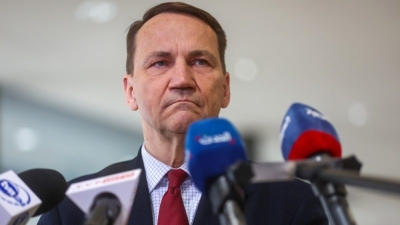EU, India kick off digital cooperation with underlying frictions on data

The EU-India Trade and Technology Council met for the first time in Brussels on Tuesday (16 May), paving the way for cooperation in several strategic areas, but with underlying tension over international data flows clouding the horizon.
Brussels and New Delhi set up the Trade and Technology Council (TTC) in February to provide a permanent structure for dialogue on digital and trade policies, following the format of an existing collaboration structure between the EU and the United States.
India is a fast-growing economy, set to battle with China for the world’s top rank in terms of GDP in the coming decade. Via the TTC, the EU wants to ramp up cooperation with the Asian giant in areas such as strategic technologies, digital connectivity, clean energy, trade, and investments.
After the summit, EU digital chief Margrethe Vestager told reporters that the first meeting “has been very promising”.
The idea is for the two trading partners to converge on several aspects of digital policy, with the widest underlying disagreement being over the approach to cross-border data flow regulation.
The latest draft of India’s data protection bill, released last November, is weaker than the previous draft regarding the rights and protections being offered and the robustness of institutional mechanisms.
“The proposal for data localisation has been one of the thorniest issues in Indian debates on data protection,” Smriti Parsheera, a lawyer and public policy researcher on digital governance, told EURACTIV.

EU, India relaunch talks for free trade agreement
The EU and India on Friday (17 June) formally relaunched negotiations to forge a free trade agreement, with the aim of completing talks by the end of 2023.
“This partnership will become a defining moment for world trade in the 21st …
Strategic priorities
The intention to strengthen the strategic cooperation with India via the TTC was announced in April 2022, during a meeting between European Commission President Ursula von der Leyen and Indian Prime Minister Narendra Modi in New Delhi.
“The first ministerial meeting of the EU-India Trade and Technology Council (TTC) and the related stakeholder events are important steps for both sides to bridge differences on digital issues,” Maaike Okano-Heijmans, a senior research fellow at the Clingendael Institute, told EURACTIV.
Regarding emerging technologies, the EU and India committed to cooperating on quantum and supercomputers research and development projects focused on societal issues such as climate change and personalised medicine.
The meeting’s conclusions also point to coordinating policies about Artificial Intelligence and semiconductor and working together to bridge the digital skills gap. The idea is also to align on 5G and Internet of Things standards.
Green tech is another strategic area focusing on wastewater management and recycling batteries of e-vehicles.
Obstacles to market access and exchanging information on foreign direct investment screening were also on the table, with Western countries growing wary of hostile takeovers and technology transfers from Chinese companies.
“If used strategically, the TTC is potentially one of the most significant foreign policy tools at the EU’s disposal,” Stefania Benaglia, head of the Global Connectivity Programme at the Centre for European Policy Studies, told EURACTIV.
Cooperation with the largest democracy on global digital policy is not only bound to facilitate access to the rapidly expanding Asian market but would also help the EU in its crusade to set its digital rules as the global standards.
However, the two trading partners do not see eye to eye precisely in the area where Europe has been the global frontrunner: data protection.

EU mulls setting global digital standards with UN Global Digital Compact
The European Union intends to push for its digital rules to become new international standards at a United Nations convention intended to produce a global vision of the digitalised society.
Data flows in the background
Whilst the two publicly share their intent to grow closer in key digital areas, divergence is in fact growing in terms of cross-border data transfers, a critical dimension of international trade.
In November 2022, India released its fourth iteration of the proposed Digital Personal Data Protection Bills.
While the government removed some strong data localisation provisions included in the third iteration, personal data protection outside of India remains under legal uncertainty.
“In the latest version of the draft bill the Indian government has diluted its hard stance on localisation while proposing that the government will have the power to notify a positive list of jurisdictions to which personal data may be transferred,” explained Parsheera.
According to the Digital Personal Data Protection Bill, certain “countries or territories outside India to which a Data Fiduciary may transfer personal data” will be notified after assessment of factors the central government “may consider necessary.”
“This opens up a window for negotiation and mutual assessment of adequacy for cross-border flows,” Parsheera told EURACTIV.
From a European perspective, the question arises whether the Indian Digital Personal Data Protection Bill provides adequate personal data protection in line with the EU General Data Protection Regulation (GDPR).
One of the sources of incompatibility with the GDPR concerns the creation of a data protection authority that would be part of the Electronics Ministry itself and would thereby lack sufficient independence.
Unlike the EU, India links data protection with its national security, leaving many areas unchecked and at the mercy of the Indian intelligence services.
“This could test [India’s] ability to pass through the EU’s adequacy thresholds,” Parsheera concluded.

Commission updates EU countries on digital diplomacy initiatives
The European Commission briefed national representatives about the progress and priorities of the most significant partner countries in the digital domain.
Read more with EURACTIV




